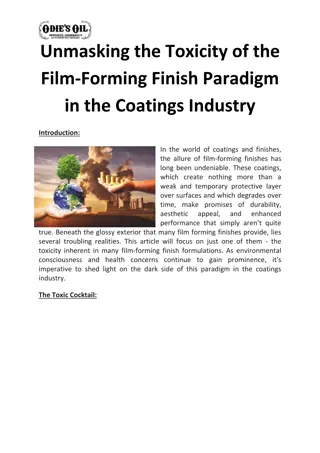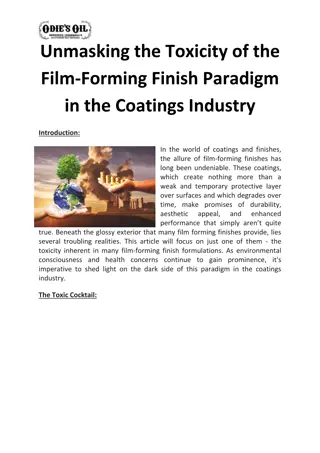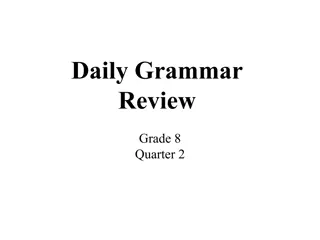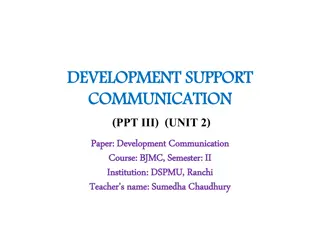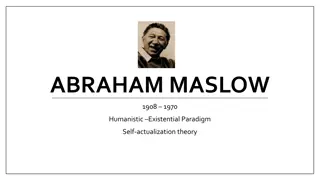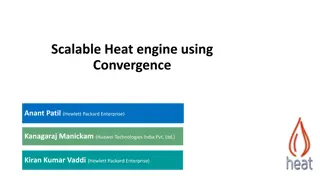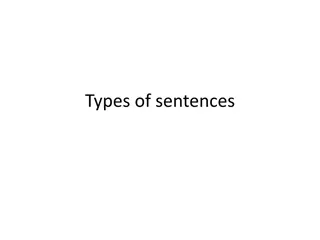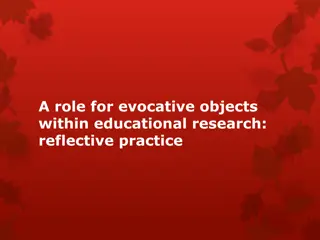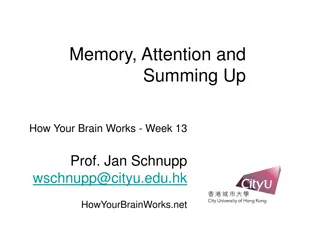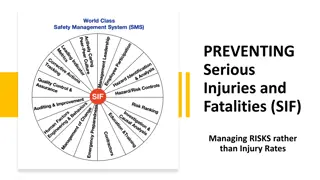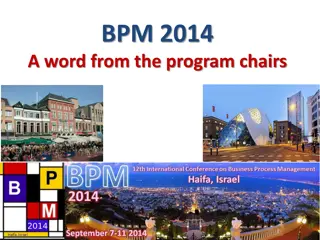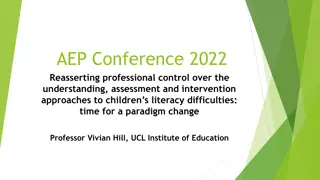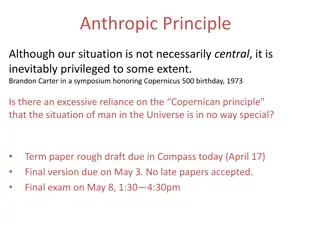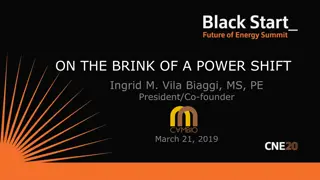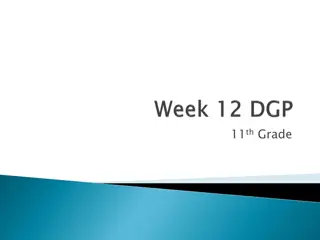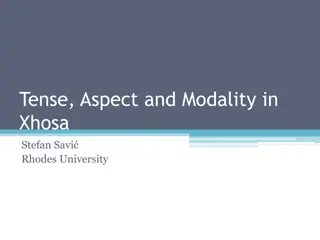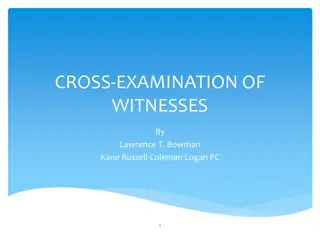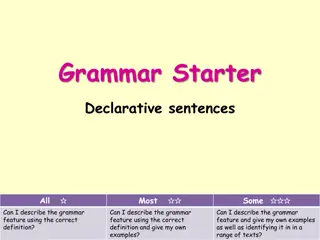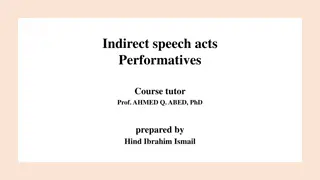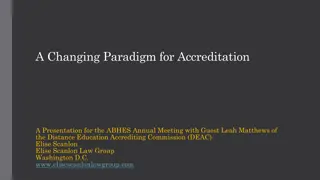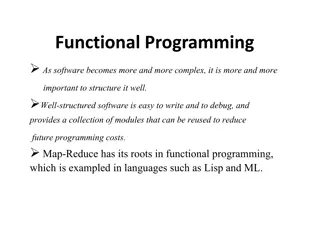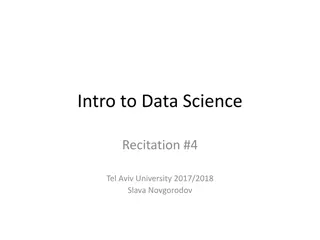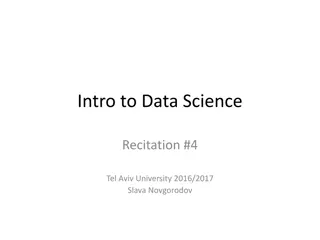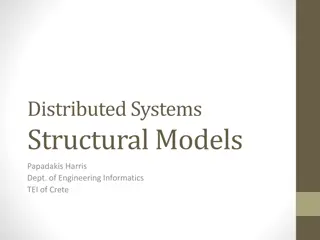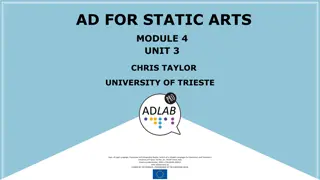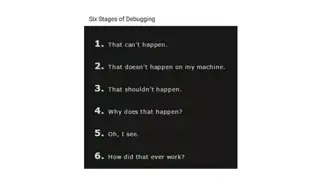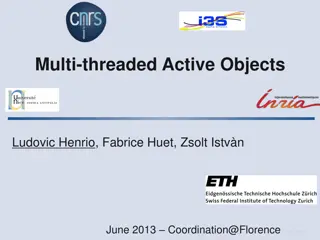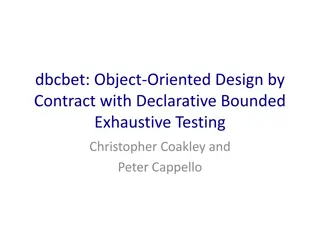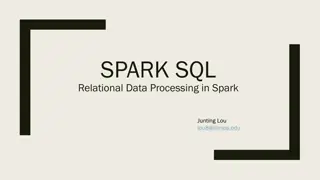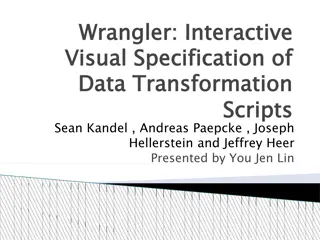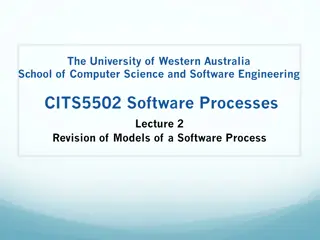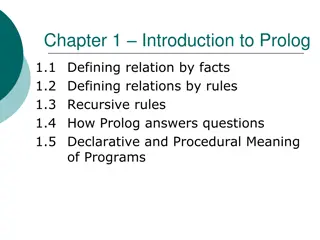A New Paradigm for Spasticity Management
New approach to managing spasticity, a disorder characterized by increased muscle tone and exaggerated tendon jerks. The author, Dr. Darryl Kaelin, explores the benefits of this new paradigm and its potential impact on motor control. The article also includes information on the etiologies and preval
1 views • 39 slides
Functional Programming
Functional programming, a paradigm that emphasizes declarative programming, pure functions, and limited side effects. Explore the benefits and characteristics of functional programming languages.
0 views • 20 slides
[PDF⚡READ❤ONLINE] Black Hole Astrophysics: The Engine Paradigm (Springer Praxis
\"COPY LINK HERE ; https:\/\/getpdf.readbooks.link\/B00DGEQPXS\n\nRead ebook [PDF] Black Hole Astrophysics: The Engine Paradigm (Springer Praxis Books) | Black Hole Astrophysics: The Engine Paradigm (Springer Praxis Books)\n\"\n
0 views • 6 slides
Dostarlimab 7.5 mg /5 ml: Transforming Cancer Care Landscape in India
Cancer care in India is undergoing a paradigm shift with the introduction of a new immunotherapy treatment: Dostarlimab. This potent formulation (7.5 mg\/5 ml) promises to change the treatment paradigm for oncologists as well as patients fighting cancer. Dostarlimab 7.5 mg\/5 ml is a revolutionary i
5 views • 7 slides
Unmasking the Toxicity of the Film-Forming Finish Paradigm in the Coatings Industry
Exposure to toxic fumes emitted by film-forming finishes during application and drying poses significant health hazards to workers and occupants of coated spaces. Painters, contractors, and DIY enthusiasts are particularly vulnerable to inhaling harmful chemicals, leading to respiratory ailments, he
1 views • 5 slides
Unmasking the Toxicity of the Film-Forming Finish Paradigm in the Coatings Industry
Exposure to toxic fumes emitted by film-forming finishes during application and drying poses significant health hazards to workers and occupants of coated spaces. Painters, contractors, and DIY enthusiasts are particularly vulnerable to inhaling harmful chemicals, leading to respiratory ailments, he
1 views • 5 slides
Daily Grammar Review Challenges for Grade 8 Students
Engage in a week-by-week grammar review for 8th-grade students. The lessons consist of identifying declarative or interrogative sentences, punctuating sentences with periods or question marks, and distinguishing between exclamatory and imperative sentences. Enhance your grammar skills with daily exe
2 views • 61 slides
Evolution of Development Communication Paradigms and Alternative Paradigm
Development Communication explores the stages of creating a plan, implementing strategies, and ownership paradigms in development projects. Emphasis is on participatory approaches, community empowerment, and inverting top-down processes. The concept of Alternative Paradigm emerges to counter the ali
2 views • 6 slides
Abraham Maslow's Humanistic Existential Paradigm
Explore the key concepts of Abraham Maslow's humanistic existential paradigm, including self-actualization theory, perspective, and views on need gratification. Learn about Maslow's belief in human potential, the motive for self-actualization, and the importance of need gratification in realizing in
1 views • 81 slides
Evolution of Strategic Management in Tourism: A New Paradigm
Explore the radical transformations in strategic management over the past 25 years, focusing on the New Strategic Theory and the Half Moon Bay Group initiatives. Discover how complexity, non-linearity, and fluidity guide the new emergent paradigm. Learn about the changes in approach to strategy and
3 views • 11 slides
Overview of Scalable Heat Engine using Convergence
Anant Patil and Kanagaraj Manickam discuss a scalable heat engine using convergence architecture, offering insights into design evolution, comparison, and progress. The presentation covers an orchestration service to manage cloud applications, including modeling, deployment, scalability, configurati
0 views • 33 slides
The Four Types of Sentences
Declarative, imperative, interrogative, and exclamatory sentences each serve a unique purpose in communication. Declarative sentences state facts, imperatives give commands, interrogatives ask questions, and exclamatory sentences express strong emotions. By recognizing the characteristics of each ty
0 views • 18 slides
Evocative Objects in Educational Research: A Reflective Paradigm
Delve into the role of evocative objects in educational research through a reflective practice approach, exploring generative and divergent analysis models, and considering alternative quality criteria. The creative analytic paradigm emphasizes the serendipitous nature of engaging with objects for a
0 views • 21 slides
How Your Brain Works: Memory, Attention, and Processing
Delve into the intricate workings of memory, attention, and cognitive processing in the brain as explored by Prof. Jan Schnupp. Discover the various types of memory, including short-term and long-term, procedural, declarative, and more. Explore the concept of working memory and its neuronal mediatio
0 views • 66 slides
Preventing Serious Injuries and Fatalities (SIF): A Paradigm Shift in Workplace Safety
The SIF approach emphasizes managing risks over injury rates to prevent serious workplace incidents. Traditional safety metrics focusing on minor injuries may not effectively prevent SIF events. Special attention and a new safety paradigm are needed to address high-risk workplaces and protect worker
0 views • 16 slides
Business Process Management Conference 2014 Program Highlights
The BPM 2014 conference program features keynotes on Cognitive Computing and learning organizations, along with paper sessions covering various topics such as User Centered Process Approaches, Process Analytics, and Declarative Processes. The event includes tutorials, demos, submission statistics, g
0 views • 7 slides
Paradigm Change in Addressing Children's Literacy Difficulties
Professor Vivian Hill advocates for a paradigm change in understanding, assessing, and intervening in children's literacy difficulties at the AEP Conference. Challenges in the field are discussed, including the need to move towards inclusive, universal responses for all children with literacy delays
0 views • 28 slides
The Anthropic Principle and the New Paradigm in Physics
Exploring the Anthropic Principle and the New Paradigm in physics, this content delves into the concept that our existence is inevitably privileged, as well as the potential unification of Quantum Mechanics and General Relativity. It reflects on the conditions necessary for life, the role of physica
0 views • 17 slides
Embracing Paradigm Shift Towards Distributed Power and Clean Energy
The paradigm shift towards distributed power and clean energy brings about a transformative future where individuals play an active role, leading to a society with a stronger local economy integrated globally through innovative exchanges. Technology empowers users to create content and participate i
0 views • 5 slides
Influence of Native Americans on English Vocabulary
Words like cannibal, canoe, hurricane, and barbecue were borrowed from Native Americans, shaping the English language. The simple declarative sentence discusses this linguistic influence, highlighting subjects, verbs, and participial phrases. The images provide visual context to aid in understanding
0 views • 9 slides
Future Mobility: A New Paradigm in Legal Frameworks and Technology
Explore the evolving landscape of future mobility through the lens of legal frameworks and technology advancements. Delve into how traditional taxonomies are inadequate for modern transport innovations, emphasizing the significance of data in conjunction with movement in this dynamic paradigm.
0 views • 23 slides
Tense, Aspect, and Modality in Xhosa Verbal Paradigm
This study on Xhosa language by Stefan Savi from Rhodes University delves into the intricate aspects of tense, aspect, and modality in the Xhosa verbal paradigm. It discusses the structure of Xhosa, its unique features, and how these elements manifest in different tenses and aspects, shedding light
0 views • 42 slides
Mastering Cross-Examination of Witnesses in Legal Settings
Delve into the art of cross-examination with insights from Lawrence T. Bowman and Kane Russell Coleman Logan PC. Explore the power of cross-examination in uncovering truth, the competitive nature of trials, and the distinction between discovery depositions and trial cross-examination. Learn how to e
0 views • 41 slides
Examples of Declarative and Interrogative Sentences
Explore examples of declarative and interrogative sentences, understand their definitions, and learn to convert questions into statements. Dive into various texts to identify these sentence types and enhance your grammar skills.
0 views • 5 slides
Indirect Speech Acts Performatives Course Tutor Prof. Ahmed Q. Abed, PhD by Hind Ibrahim Ismail
Deborah Tannen's experience in Greece illustrates how indirect speech acts can convey unintended meanings. Performatives, as discussed by J.L. Austin, are declarative sentences that do not simply describe but actively change reality. Understanding sentence meaning requires considering not just truth
0 views • 12 slides
Changing Paradigm in Accreditation: Legislative Landscape and Recommendations
This presentation discusses the evolving paradigm in accreditation within the education sector, focusing on legislative updates, including the introduction of bills, hearings, and the shifting responsibilities of accrediting bodies. It also highlights the recommendations put forth by the HELP Task F
0 views • 11 slides
Functional Programming Paradigm
Functional programming emphasizes well-structured software that is easy to write and debug, with reusable modules to reduce future programming costs. It introduces higher-order functions and first-class function values, fostering declarative programming for tasks like symbolic data manipulation and
0 views • 21 slides
Introduction to Map Reduce Paradigm in Data Science
Explore the MapReduce paradigm in data science through examples, discussions on when to use it, and implementation details. Understand how MapReduce is utilized for processing and generating big data sets efficiently.
0 views • 52 slides
Introduction to MapReduce Paradigm in Data Science
Today's lesson covered the MapReduce paradigm in data science, discussing its principles, use cases, and implementation. MapReduce is a programming model for processing big data sets in a parallel and distributed manner. The session included examples, such as WordCount, and highlighted when to use M
0 views • 48 slides
Client-Server Paradigm in Distributed Systems
Client-server paradigm in distributed systems involves structuring systems as collaborating processes where clients request services from servers. The model follows a request/reply protocol, with servers providing centralized control of shared resources. Advantages include security and simplicity, w
1 views • 30 slides
Grammar on the Go! Unit 5 Lesson 7 Sentence Corrections & Clauses
This content focuses on sentence corrections in red, defining vocabulary words, and understanding different types of sentences such as compound, complex, simple, and compound/complex. It also covers identifying sentence types like declarative, imperative, interrogative, and exclamatory. Additionally
0 views • 9 slides
Linguistic and Textual Features of Ad in Static Arts
Explore the linguistic and textual features of advertising in static arts, focusing on the use of present tense, short declarative sentences, and vivid vocabulary. Understand how cohesion, repetition, and non-finite verbs contribute to the impact of museum advertisements compared to general ads.
0 views • 23 slides
Declarative Programming and Regular Expressions
Declarative programming emphasizes describing the desired result rather than the computational processes, leading to domain-specific languages designed for specific problem domains. Regular expressions offer powerful pattern matching capabilities facilitating tasks such as parsing, querying database
0 views • 28 slides
Multi-threaded Active Objects: Issues and Solutions
The document delves into the realm of multi-threaded active objects, exploring their principles, limitations, related works, and solutions. It covers topics such as asynchronous method calls, first-class futures, and the risks associated with active objects. Additionally, it compares various approac
0 views • 29 slides
Object-Oriented Design by Contract with Declarative Bounded Testing
Comprehensive overview of Object-Oriented Design by Contract (DbC) with Declarative Bounded Testing, exploring its background, principles, implementation in programming languages, and application through bounded exhaustive testing. Learn how DbC enhances software reliability and development practice
0 views • 31 slides
Overview of Spark SQL: A Revolutionary Approach to Relational Data Processing
Spark SQL revolutionized relational data processing by tightly integrating relational and procedural paradigms through its declarative DataFrame API. It introduced the Catalyst optimizer, making it easier to add data sources and optimization rules. Previous attempts with MapReduce, Pig, Hive, and Dr
0 views • 29 slides
Wrangler: Interactive Visual Specification of Data Transformation
Data wrangling is a crucial step before analysis, involving restructuring, correcting errors, and combining sources. Addressing the time-consuming nature of data preparation, Wrangler offers a user-friendly interface with a declarative transformation language, supporting various transforms and inter
0 views • 42 slides
The Body, Soul, and Spirit Paradigm in Human Existence
Exploring the concept of ternary anthropology introduced by French anthropologist Michel Fromaget, which views humans as composed of body, soul, and spirit. This paradigm, rooted in both Eastern and Western traditions, delves into the ontological value of the mind and the overall human experience. T
0 views • 36 slides
Overview of Software Process Models and Prototyping Paradigm
This document discusses different models of software processes, including Waterfall, Prototyping, and Agile paradigms. It covers key concepts, levels of abstraction, 12 activities in every software project, and the phases of the Waterfall model. Additionally, it explores the Prototyping Paradigm and
0 views • 15 slides
Overview of Prolog Programming Paradigm
Prolog is a logic programming language that defines relations through facts and rules, allowing recursive rules for powerful computations. It provides a declarative way of expressing programs and offers flexibility in knowledge representation. The language uses clauses, predicates, and variables to
0 views • 19 slides


![[PDF⚡READ❤ONLINE] Black Hole Astrophysics: The Engine Paradigm (Springer Praxis](/thumb/21503/pdf-read-online-black-hole-astrophysics-the-engine-paradigm-springer-praxis.jpg)

